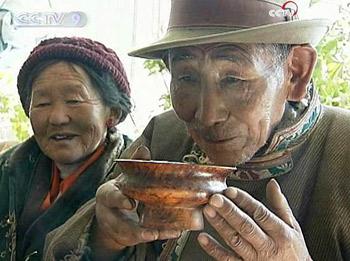77-year-old villager, Lobsang and his wife still remember the days when they were serfs at their master's ranch. They said at that time they were just serfs and had no freedom whatsoever.

Lobsang said, "I began serving my master when I was eight. It was hard work every day."
His wife said she had to salute their masters and noblemen on the street by taking off their hats or else they would have been beaten.
Deprivation of personal belongings were also a common occurrence. And access to education was beyond their wildest dreams. The illiteracy rate before 1959 in Tibet stood as high as 95 percent.
But since democratic reform in 1959 times have changed in the Tibet Autonomous Region.
Now Lobsang earns about 70,000 yuan per year. Along with government subsidies, he says he lives a comfortable life. What pleases him even more is the local school in his village. His grandson studies there thanks to the central government's free compulsory education system.
Director of local NPC, Kesong villager, said, "It is fair to say that without the Communist Party of China, a new Tibet couldn't have been possible. And the happy lives of the descendents of former serfs couldn't have been possible."
50 years after the democratic reform of Tibet the changes in Kesong Village reflect the broader changes that have taken place all over the Tibet Autonomous Region. As the Central government continues its favorable policies and bolstered by the ingenuity of the local people it's hoped that Tibetans will live an even happier life in the years to come.
(CCTV February 23, 2009)